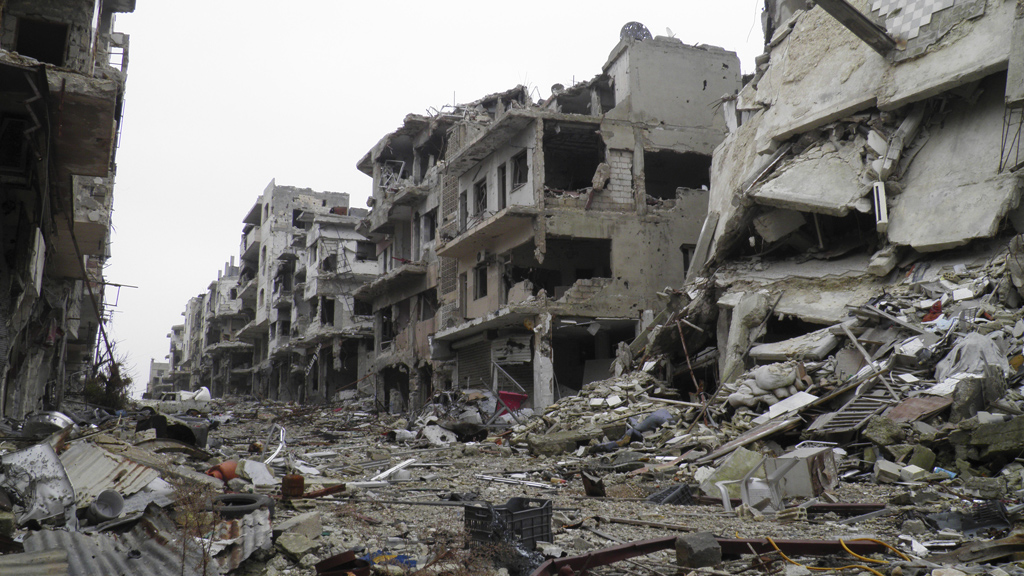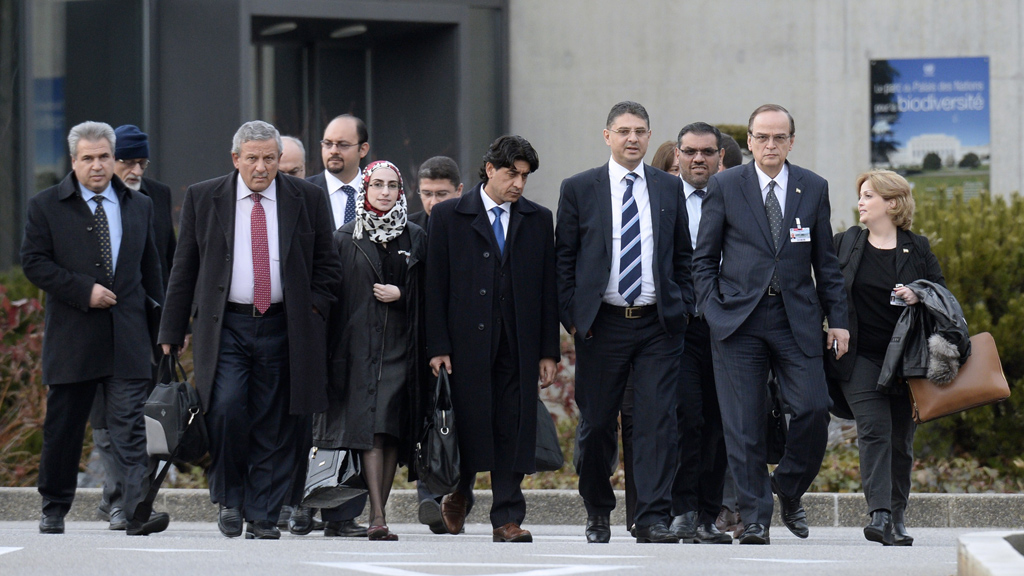‘The keys of Damascus’: Assad draws red line on Syria
The Syrian opposition says the government has failed to address President Bashar al-Assad’s political future at peace talks in Geneva.

The Syrian government and opposition delegation sat down again with a UN mediator for talks in Geneva on Monday.
However, the Syrian government team is said to have presented a “declaration of principles” that did not mention transfer of power.
The opposition’s chief negotiator Hadi al Bahra said: “The declaration is outside the framework of Geneva, which centres on creating a transitional governing body. It fails to address the core issue.”
There was little sign on Monday of a softening of positions on the core issue the opposition and their western and Arab backers say was agreed by a United Nations conference at Geneva 18 months ago.
Syria’s Deputy Foreign Minister Faisal al-Mikdad said President al-Assad had no intention of giving up “the keys to Damascus”.
“This is a red line. If some people think we are coming here to give them the keys of Damascus they are wrong,” said Mr al-Mikdad, echoing the language US President Barack Obama used to describe a chemical weapons attack in Syria.
Homs
Opposition spokesman Monzer Akbik also told reporters that so far there has been “no progress in the humanitarian corridors”.
A tentative agreement was reached on Sunday to let women and children leave a blockaded part of the old city of Homs.
Mr Akbik described it as a moral outrage and said people trapped in the city should receive aid inside their city and then have the freedom to leave or stay.
He said the city of Homs remains “under starvation siege”, and that there has been no progress in the release of the prisoners.
“The regime is saying that it’s going to allow the convoys,” Mr Akbik said.
“There are 12 trucks of Red Crescent waiting there for the regime to allow them in but they are not allowed yet.”
Mr al-Mikdad told a news conference on Sunday that the government would let women and children leave the city centre if rebels gave them safe passage.
But Mr Akbik said people in Homs should be given access to aid in their city, rather than evacuating them.
“We don’t trust them of course but here we are now doing those agreements under the United Nations’ management so there should be guarantees of course that the regime should keep the safety.
“But our position is we don’t agree that these people should go out of their city. Our position is that they should stay in the city and get the food in their homes. This is their right,” he said.
Both sides claim to represent the Syrian people.

Arab League and United Nations envoy Lakhdar Brahimi said opposition delegates, who have asked for the release of nearly 50,000 detainees, had agreed to a government request to try to provide a list of those held by armed rebel groups – though many of these groups, fighting among themselves, do not recognise the negotiators’ authority.
Underlining the difficulty of implementing even local agreements on the ground, a UN agency trying to deliver aid to a besieged rebel area of Damascus said state checkpoints had hampered its work, despite assurances from the government that it would allow the distributions.
Profound mutual mistrust and the absence from Geneva of powerful Islamist opposition groups make any substantial progress very difficult, and previous aid deals and ceasefires in Syria have proved short-lived.
‘Al-Qaeda haven’
The western-backed opposition, made up largely of exiled Syrians, says President Assad has lost legitimacy and can no longer lead a country after unleashing the military on largely peaceful protests nearly three years ago.
The government says the rebellion is rife with “terrorists” and that President Assad is the only person able to end the fighting, blaming the west and Gulf states – especially Saudi Arabia – for turning the country into an Al-Qaeda haven.
Homs was considered a promising place to start the negotiations. Neighbourhoods in the old city have been ravaged and emptied of residents following repeated government assaults to reclaim control from rebels.
Activists say about 800 families are trapped, without regular access to food, medicine and basic necessities. The two sides failed to reach agreement on a prisoner exchange, as Mr Brahimi had hoped.
Mr Al-Mikdad said a list of names submitted by the opposition was greatly exaggerated, adding the government had no children in its jails, while the opposition said it had no control over the militants who have kidnapped hundreds of people.
-
Latest news
-
Tim Booth of the band James’ on agism in music, topping the charts and AI6m

-
As India goes to the polls in the world’s largest election – what do British-Indians think?6m

-
Tees Valley: Meet the candidates in one of the biggest contests coming up in May’s local elections4m

-
Keir Starmer says public sector reform will be a struggle7m

-
Nicola Sturgeon’s husband Peter Murrell charged with embezzlement of funds from SNP1m

-




